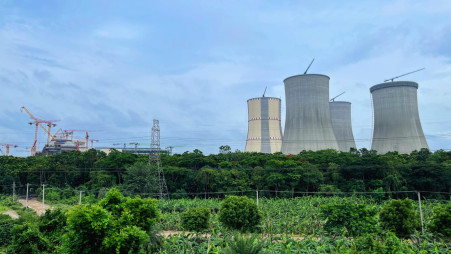Exchange rate adjustment pushes Rooppur plant cost up by Tk13,386cr
The project’s timeline has also been extended to June 2028, up from the original December 2025 completion date, following cost increases and project delays, according to planning commission sources.

The depreciation of taka against the US dollar has pushed the Rooppur Nuclear Power Project's cost up by Tk13,386 crore (11.84%), raising the total to Tk126,479 crore, the first revised proposal shows.
The initial 2016 proposal had an estimated cost of Tk113,093 crore.
Although the $11.38 billion Russian loan for the project remains unchanged in dollar terms, its value in Bangladeshi taka has risen to Tk104,004 crore from Tk91,040 crore in the original plan, an increase of Tk12,964 crore due solely to exchange rate adjustments.
According to the revised proposal, $8.29 billion of the project allocation has been utilised up to June 2025 at an exchange rate of $1 = Tk80. The remaining $3.09 billion for the next three years is estimated at $1 = Tk122, as declared by the Bangladesh Bank on 12 October 2025.

Meanwhile, the government's contribution in the original proposal was Tk22,053 crore, which has now increased slightly to Tk22,475 crore in the revised plan.
The project's timeline has also been extended to June 2028, up from the original December 2025 completion date, following cost increases and project delays, according to planning commission sources.
The Ministry of Science has submitted the revised proposal with cost and time overrun to the Planning Commission. A review meeting on the proposal is scheduled for 11 November as part of the approval process, according to commission sources.
According to officials, the Covid-19 pandemic, Russia-Ukraine conflict, and dollar crisis affected progress. The 90th joint coordination meeting on 3 June 2025 decided to extend the timeline.
Being implemented under an intergovernmental agreement between Bangladesh and Russia, the project includes the construction of two 2,400-megawatt units, equipment supply, training, and fuel provision. The plant location is in Pabna district.
Other reasons behind cost hike
Costs have risen for civil works, equipment imports, technical consultancy, security, and training. A revised design, which strengthens security infrastructure, environmental monitoring, and cybersecurity systems, has also contributed to the increase.
Officials say the main goal of the revisions is not merely to raise expenditure but to meet international safety standards, ensuring the project is sustainable and operationally effective. The revised proposal provides adequate allocations for local and international training, monitoring units, and consultancy services.
For example, the Rooppur plant's CD-VAT allocation has been increased by Tk178.40 crore, bringing the total to Tk378.40 crore, as several contractor-imported items are scheduled for delivery in 2026 and 2027.
Office equipment allocation has been raised from Tk37.73 crore for 4,185 units to Tk50 crore, accounting for future expansion and price adjustments. Vehicle allocations have increased from Tk67.15 crore for 102 units to Tk100 crore, reflecting current requirements.
In addition, 336 new contracts, including fuel and used-fuel supply agreements, have been signed. Extra work, overtime, and committee fees account for an additional Tk10.26 crore in the revised proposal. While costs have increased in many areas, officials note that expenditure has decreased in some sectors.
1200MW Unit-1 goes into commercial production next year
The first unit of the Rooppur Nuclear Power Plant is now scheduled to begin commercial electricity production in 2026, according to the revised project proposal.
Originally, Unit-1 was expected to come online in December 2024 and Unit-2 in December 2025, but implementation delays have pushed back the schedule.
Fuel loading for a trial start of Unit-1 is planned for December this year, with partial generation expected by March 2026 at around 30% capacity. Production will then ramp up gradually to the full 1,200 MW per unit, giving the plant a total capacity of 2,400 MW.
As of August, the project has achieved 74.24% physical progress. The plant is being built by Russian contractor Atomstroyexport.



 Keep updated, follow The Business Standard's Google news channel
Keep updated, follow The Business Standard's Google news channel















